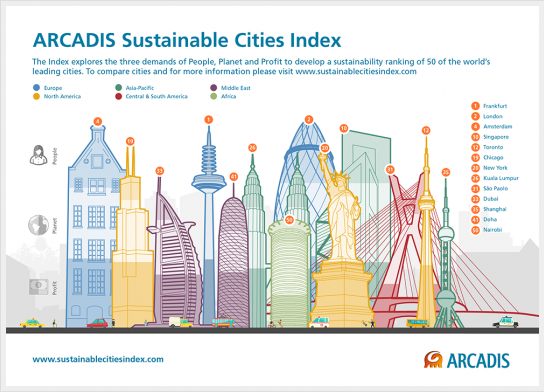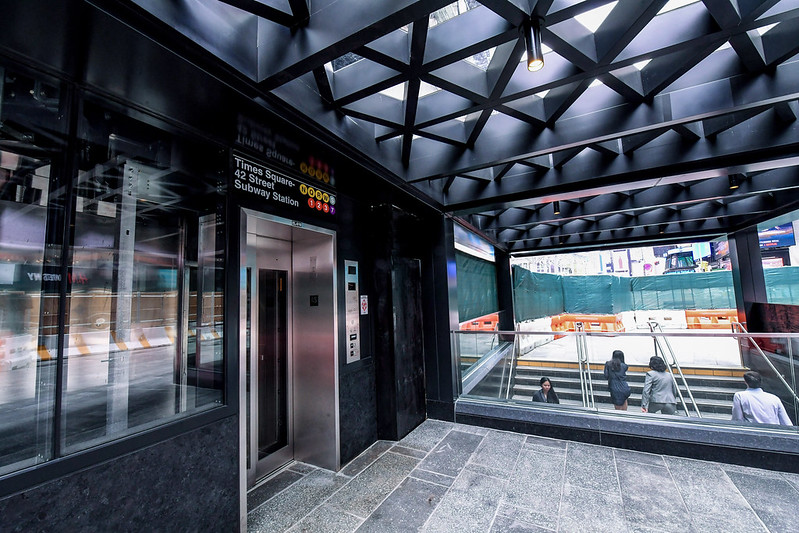
Photo: Arcadis-Sustainable-Cities-Index
ARCADIS launches Sustainable Cities Index
07 April 2015
by Richard Forster
ARCADIS, a natural and built asset design and consultancy firm, has launched the inaugural Sustainable Cities Index, which seeks to bring together many data points into one place and take a more rounded view of what makes a city sustainable.
The Index, which was conducted by the Center for Economics and Business Research, explores the three demands of social (People), environmental (Planet) and economic (Profit) to develop an indicative ranking of 50 of the world’s leading cities.
“The purpose of our index is to indicate areas of opportunity as cities continue to make progress on their missions to become more sustainable economically, environmentally and for the good of their inhabitants,” John Batten, Global Cities Director at ARCADIS, told Cities Today. “As our world becomes increasingly more reliant on its urban centres, it is our hope that city leaders find the Index to be a valuable tool in assessing their priorities and pathways to urban sustainability for the good of all.”
Well-established European cities come top of the overall rankings, taking seven of the first ten places. Frankfurt leads the world, followed by London, Copenhagen, Amsterdam and Rotterdam. Frankfurt also takes first place on the Profit sub-index, just ahead of the UK’s capital city.
Rotterdam tops the People sub-index due to broad success including high literacy and a good work-life balance. Meanwhile two German cities, Frankfurt and Berlin, lead the way on Planet factors, scoring particularly well for waste management and low levels of air pollution.
“Of the top ten, seven cities were from Europe,” added Batten. “The key reason is that sustainability has been firmly on the agenda for a far longer period of time in Europe than in many in other parts of the world. Frankfurt, for example, has been championing the cause since 1990 when it created its own energy agency and became a founding member of the Climate Alliance of European Cities. US cities, by comparison, do well in Profit scores, but have only started to focus their plans on People and Planet actions relatively recently.”
The Index highlights that across the world, cities are performing better for being sustainable for Profit and Planet purposes than they are for People factors. Many of the world’s economic powerhouses are becoming less affordable for their citizens, with the cost of property in New York, London, Paris, Tokyo and Hong Kong penalising their rankings. There is also a trade-off globally between strong education and poor work-life balance, particularly demonstrated in Hong Kong.
“City leaders need to find ways to balance the demands of generating strong financial returns, being an attractive place for people to live and work in, whilst also limiting their damage to the environment,” said Batten. “To truly understand how sustainable a city is, we must understand how it ranks in People, Planet and Profit. Only then can city leaders act to assess their priorities, and the pathway to urban sustainability – for the good of all.”
Overall the top ten and bottom ten cities in the 2015 ARCADIS Sustainable Cities Index are:
Top ten
1. Frankfurt
2. London
3. Copenhagen
4. Amsterdam
5. Rotterdam
6. Berlin
7. Seoul
8. Hong Kong
9. Madrid
10. Singapore
Bottom ten
41. Rio de Janeiro
42. Doha
43. Moscow
44. Jeddah
45. Riyadh
46. Jakarta
47. Mumbai
48. Wuhan
49. New Delhi
50. Nairobi
The full rankings can be viewed at www.sustainablecitiesindex.com.











